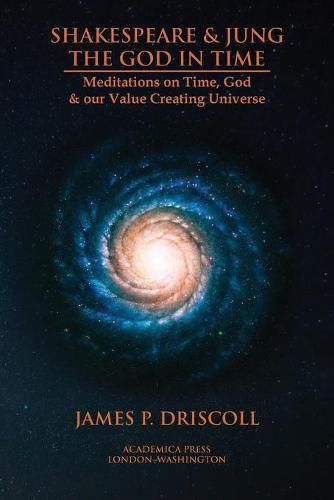Readings Newsletter
Become a Readings Member to make your shopping experience even easier.
Sign in or sign up for free!
You’re not far away from qualifying for FREE standard shipping within Australia
You’ve qualified for FREE standard shipping within Australia
The cart is loading…






This title is printed to order. This book may have been self-published. If so, we cannot guarantee the quality of the content. In the main most books will have gone through the editing process however some may not. We therefore suggest that you be aware of this before ordering this book. If in doubt check either the author or publisher’s details as we are unable to accept any returns unless they are faulty. Please contact us if you have any questions.
In Shakespeare and Jung - The God in Time literary critic and philosopher James Driscoll presents original arguments for the existence and nature of God. He traverses the boundaries of art, philosophy, psychology, and religion to draw on Shakespeare, Carl Jung, and A. N. Whitehead to define and illuminate the interconnections of God and time.
Time’s irreversibility and continuous creation of novelty makes it the medium and engine of order, value, and meaning. Time connects and differentiates all, thereby making reality relational and allowing for feeling, thought, art, and science.
Shakespeare, the writer with the greatest insight into human nature, dramatized the primacy of time in our lives. Time is the de facto God of Shakespeare’s worlds. Shakespeare anticipated our own age when time began to displace eternity as the ground of reality.
Jung gave us a new map of the psyche and terminology to explore more deeply the human condition, bound as it is in time, and the nature of deity. Driscoll carries Jung’s insights further into the three paradigmatic revelations of the Western Godhead: The Book of Job, the Gospels, and Shakespeare’s King Lear. Shakespeare the artist grasped the dynamics of the Western Godhead giving us a singular revelation of its dominant archetypes, Yahweh, Job, Prometheus, and Christ.
The archetypes of the Western Godhead shaped the development of art, science, and technology and energized the ideals of progress and freedom. The West advanced rapidly in science, the arts, and human rights because of the unique archetypal dynamics of its God in Time.
$9.00 standard shipping within Australia
FREE standard shipping within Australia for orders over $100.00
Express & International shipping calculated at checkout
This title is printed to order. This book may have been self-published. If so, we cannot guarantee the quality of the content. In the main most books will have gone through the editing process however some may not. We therefore suggest that you be aware of this before ordering this book. If in doubt check either the author or publisher’s details as we are unable to accept any returns unless they are faulty. Please contact us if you have any questions.
In Shakespeare and Jung - The God in Time literary critic and philosopher James Driscoll presents original arguments for the existence and nature of God. He traverses the boundaries of art, philosophy, psychology, and religion to draw on Shakespeare, Carl Jung, and A. N. Whitehead to define and illuminate the interconnections of God and time.
Time’s irreversibility and continuous creation of novelty makes it the medium and engine of order, value, and meaning. Time connects and differentiates all, thereby making reality relational and allowing for feeling, thought, art, and science.
Shakespeare, the writer with the greatest insight into human nature, dramatized the primacy of time in our lives. Time is the de facto God of Shakespeare’s worlds. Shakespeare anticipated our own age when time began to displace eternity as the ground of reality.
Jung gave us a new map of the psyche and terminology to explore more deeply the human condition, bound as it is in time, and the nature of deity. Driscoll carries Jung’s insights further into the three paradigmatic revelations of the Western Godhead: The Book of Job, the Gospels, and Shakespeare’s King Lear. Shakespeare the artist grasped the dynamics of the Western Godhead giving us a singular revelation of its dominant archetypes, Yahweh, Job, Prometheus, and Christ.
The archetypes of the Western Godhead shaped the development of art, science, and technology and energized the ideals of progress and freedom. The West advanced rapidly in science, the arts, and human rights because of the unique archetypal dynamics of its God in Time.